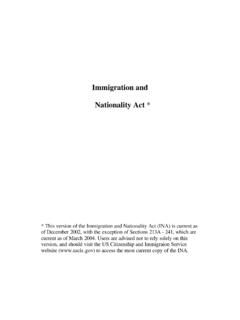Transcription of [Insert title of document] - GOV.UK
1 Policy name: Home Detention Curfew (HDC) Policy Framework Reference: N/A Re-issue Date: 26th June 2021 Implementation Date: 26th June 2021 Replaces the following documents which are hereby cancelled: PSO 6700 Home Detention Curfew. PSI & PI 01/2018 Home Detention Curfew Assessment Process. PSI 43/2012 Home Detention Curfew, PSI 17/2008 Amendments to PSO 6000; PSO 6300 and PSO 6650, in relation to calculation of release dates for DCR prisoners. PSI 41/2008 Introduction of Cross Border Arrangements between England and Wales and Scotland for Home Detention Curfew purposes. PSI 49/2007 Bail and HDC Support Services. PSI 31/2006 Impact of CJA 2003 & consolidation of guidance (and guidance on presumed unsuitability). PSI 31/2003 Changes to HDC (guidance on presumed unsuitability). PC 82/1998 HDC Accommodation and outstanding HDC issues. PC 44/1998 HDC: The Role of the Probation Service Policy Statement: Safeguarding and Promoting the Welfare of Children; Probation Service Policy Statement: Safeguarding Adults at Risk.
2 Introduces amendments to the following documents: N/A Action required by: HMPPS HQ Probation Service Public Sector Prisons HMPPS Contract Managers Contracted Prisons Other Providers of Probation and Community Services Governors HMPPS-run immigration removal Centres (IRCs) Heads of Groups Youth Custody Estate For Information By the implementation date Governors1 of Public Sector Prisons and Contracted Prisons must ensure that their local procedures achieve the required Outcomes and comply with the Requirements as set out in this Policy Framework. 1 In this document the term Governor also applies to Directors of Contracted Prisons. Home Detention Curfew (HDC) Policy Framework Re-Issue Date: 26 June 2021 2 Governors must ensure that any new local policies that they develop because of this Policy Framework are compliant with relevant legislation, including the Public-Sector Equality Duty (Equality Act, 2010).
3 Mandatory Actions All groups referenced above must adhere to the Requirements section of this Policy Framework, which contains all mandatory actions. Audit/monitoring HMPPS Deputy Directors of Custody and Controllers, the Executive Director of Probation and Youth Offending Teams (YOT) in England and Director of HMPPS in Wales will monitor compliance with the mandatory requirements set out in this framework. HMPPS contract management will hold providers to account for the delivery of mandated requirements as required in the contract. Resource Impact No additional resource demand will be made by this Policy Framework. Contact The HDC Policy Helpline can be contacted on 020 3334 5044, 020 3334 4689 or Deputy/Group Director sign-off: Sarah Coccia, Executive Director, Public Sector Prisons South, HMPPS Approved by: Kevin Reilly and Peter Greenhill, Joint Chair, Operational Policy Sub-Board, April 2021 Revisions Date Changes 29 April 2020 Addition of Covid-19 related offences to Annex E 18 December 2020 Change to sentencing code para and Change to the decision making level in contracted prisons para 26 June 2021 Changes to reflect advent of Unified Probation Service para deleted; annex G.
4 HDC Address Checks Form Home Detention Curfew (HDC) Policy Framework Re-Issue Date: 26 June 2021 3 CONTENTS Section title Page 1 Purpose 4 2 Evidence 4 3 Outcome 4 4 Requirements 5 Legal Requirements 5 Other Requirements 5 Eligibility and presumed unsuitability 9 Establishing proposed address 12 Address checks process 14 Assessment and decision 15 Notifying the Supervised Individual of the decision 17 Setting curfew conditions 17 Post-release procedures 17 Cross border HDC 20 HDC for children 20 5 Guidance Annex A Timeframe for HDC process 21 Annex B HDC Assessment Process Flow Chart 23 Annex C Effect of Recall on HDC Eligibility 24 Annex D Identifying presumed unsuitable supervised individuals and applying the exceptional circumstances test 25 Annex E Examples of presumed unsuitable offences 27 Annex F Guidance on calculating the HDCED where there are multiple sentences 30 Annex G HDC Guidance for probation providers (completing address suitability)
5 Checks) 34 Annex H Notifying the Supervised Individual of the decision 43 Annex I Setting the curfew conditions 45 Annex J Cross border HDC 47 Annex K Updated HDC forms 50 Home Detention Curfew (HDC) Policy Framework Re-Issue Date: 26 June 2021 4 1. PURPOSE The Home Detention Curfew (HDC) scheme provides a managed transition from prison to community for supervised individuals serving short sentences. Release on HDC should be a normal part of a sentence for most eligible supervised individuals, and refusal of HDC for those eligible and not presumed unsuitable for release the exception. Since 1999, a number of prison and probation instructions have been published in relation to the HDC process. The aim of this Policy Framework is to consolidate those instructions into one place and therefore completely replace all of the previous instructions, as listed above. The requirements and approach to HDC therefore remain largely the same but the following changes are highlighted: Decisions on HDC may now be taken by Directors of Contracted Prisons, the Controller will continue to monitor the Director s compliance in this area.
6 Decisions around presumed unsuitable supervised individuals remain with the Governor, but there is no longer any requirement to consult or notify the HDC Policy team. Offenders sentenced to 4 years or more imprisonment by an overseas court but who have less than 4 years to serve after repatriation to the UK are presumed unsuitable for release on HDC. 2. EVIDENCE People released early from prison on HDC are subject to an electronically monitored (EM) curfew. Research evidence about the impact on reoffending rates of using EM curfew with early release is inconclusive but promising, and it appears highly cost effective. The research suggests that the overall outcomes under HDC especially when costs are taken into account are preferable to keeping eligible supervised individuals in custody at the end of the custodial element of their sentence. EM is a tool to monitor compliance with the curfew, which is part of the sentence, and so enhance supervision in the community.
7 In addition to electronically monitored curfew, from 1 April 2019 it will be possible to impose location monitoring requirements as part of the HDC licence conditions across England and Wales. Research into the experience of being on EM suggests it may help some people to break habits and limit opportunities to commit crime, enhancing opportunities for employment and training, and allowing relationships, including those of mutual benefit, to develop. The evidential certainty that electronic monitoring provides may act as a deterrent and incentive to comply, although monitoring alone is unlikely to help people to think and behave differently, and successfully desist from crime, in the longer-term. Compliance while on EM may be enhanced by making the process feel as procedurally just as possible, and this means transparent, consistent decisions and procedure, and ensuring people are treated with respect and courtesy.
8 3. OUTCOMES This policy aims to ensure that: Eligible supervised individuals will be identified accurately and early. The process will operate to time without unnecessary delays, particularly to HDC releases. Home Detention Curfew (HDC) Policy Framework Re-Issue Date: 26 June 2021 5 Release on HDC will be the norm for eligible supervised individuals, so that most can benefit from the extra stability on release that HDC offers. HDC will be refused or postponed for eligible supervised individuals by exception. This includes: o when there are outstanding proceedings for offences committed during the current sentence; or o where the risk management plan cannot be put in place at the proposed release address. Those on HDC will be supported to complete HDC successfully by timely consideration of licence variation requests.
9 4. REQUIREMENTS Legal Requirements The statutory requirements of the scheme are set out primarily in section 246 of the Criminal Justice Act 2003. Although there is no statutory entitlement to release on HDC, the policy is that supervised individuals who are eligible and suitable for the scheme are released on, or shortly after the HDC eligibility date (HDCED), wherever possible. HDC is only available to supervised individuals who are serving a sentence of imprisonment of at least 12 weeks but less than four years who have served the requisite custodial period of the sentence. This is reached once the Supervised Individual has served at least a quarter of the sentence, and a minimum of 28 days. The maximum period of release is 135 days. As with any sentence, the custodial period might include time on remand in custody or on bail with an EM curfew ( tagged bail ), so release can occasionally take place very soon after sentence, although the law requires at least 14 days in custody post sentence before a Supervised Individual can be released on HDC.
10 On release, the Supervised Individual must be subject to an electronically monitored curfew. This must be for at least 9 hours per day by law, and generally for 12 hours per day as a matter of policy, reflecting the fact that the Supervised Individual is still serving the custodial element of the sentence. The curfew requirement must remain in force until what would have been the conditional or automatic release date (CRD or ARD) at the halfway point of the sentence. Certain supervised individuals are excluded in law, and therefore cannot be released on HDC under any circumstances (listed at paragraph ), and others are presumed unsuitable for HDC in policy (listed at paragraph ). The scheme applies to people of any age ( including those under 18) who are serving sentences of detention under section 250 of the Sentencing Code (formerly section 91 of the Powers of Criminal Courts (Sentencing) Act 2000 - for certain specified serious offences).














